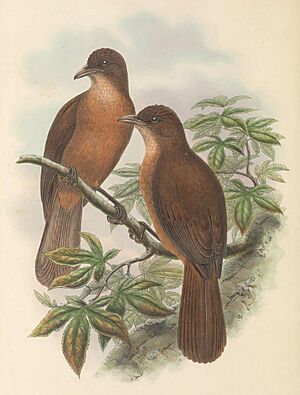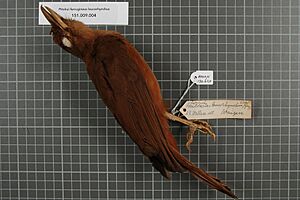Rusty pitohui facts for kids
Quick facts for kids Rusty pitohui |
|
|---|---|
 |
|
| Illustration by William Matthew Hart | |
| Conservation status | |
| Scientific classification |
|
| Kingdom: | Animalia |
| Phylum: | Chordata |
| Class: | Aves |
| Order: | Passeriformes |
| Family: | Pachycephalidae |
| Genus: | Pseudorectes |
| Species: |
P. ferrugineus
|
| Binomial name | |
| Pseudorectes ferrugineus (Bonaparte, 1850)
|
|
| Subspecies | |
|
See text |
|
| Script error: The function "autoWithCaption" does not exist. | |
| Synonyms | |
|
|
Script error: No such module "Check for conflicting parameters".
The rusty pitohui (Pseudorectes ferrugineus) is a unique bird found in the lowland forests of the Aru Islands and New Guinea. It's known for its rusty brown feathers and is part of the Pachycephalidae bird family.
Contents
About the Rusty Pitohui
The rusty pitohui is a medium-sized songbird. It grows to be about 28 centimeters (11 inches) long. This bird has a strong black bill and pale eyes. Its belly is a yellowish-buff color.
Some rusty pitohuis have a special feature. Birds from the islands of Waigeo and Batanta have a whitish bill. The rusty pitohui is the largest bird in its family. Both male and female birds look very similar.
Where Does It Live?
The rusty pitohui lives only in certain areas. You can find it in the lowland and hill forests. These areas include New Guinea, the Aru Islands, and the West Papuan islands.
Rusty Pitohui Subspecies
There are six different types, or subspecies, of the rusty pitohui. Each one lives in a slightly different place:
- P. f. leucorhynchus - Found on Waigeo island, near western New Guinea.
- P. f. fuscus - Lives on Batanta island, also near western New Guinea.
- P. f. brevipennis - Found on the Aru Islands, off southwestern New Guinea.
- P. f. ferrugineus - Lives on Misool and Salawati islands, and in northwestern New Guinea.
- P. f. holerythrus - Found on Yapen island and in north-central New Guinea.
- P. f. clarus - Lives in eastern and southern New Guinea.
How It Behaves
Rusty pitohuis often hang out in small groups. They sometimes join other types of birds. These birds build their nests in the forks of trees. Their nests are deep and shaped like a cup. They use sticks, leaves, and stems to make them.
Its Conservation Status
The rusty pitohui is common in the places where it lives. Because of this, it is listed as "least concern" on the IUCN Red List of Threatened Species. This means it is not currently in danger of disappearing.
 | Bessie Coleman |
 | Spann Watson |
 | Jill E. Brown |
 | Sherman W. White |



